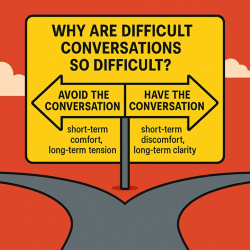Last month, in August 2025 we hosted our popular ‘Difficult Conversations; Tackling the Tough Stuff’ virtual workshop, and as always, the real impact came from the discussions and questions participants asked. Many were the ones we hear during on-site coaching with our healthcare partners, so we thought we’d share a few, along with some practical tips.
“What if they get annoyed with me for raising it?”
It’s a common concern. And yes, discomfort is part of these conversations. But approaching with respect, curiosity and clarity of purpose helps. Avoiding the issue might feel easier in the moment, but the long-term risks, being trust, team dynamics, and even the impact on patient care, are far greater.
“What if they get upset or emotional?”
Emotions are human. Make space for them, don’t shut them down. Preparation is key: know what you need to say, stay calm, and give the person time to process. Remember, seeking to understand is just as important as being understood.
“What if it’s not that serious—should I still bring it up?”
If it’s affecting performance, behaviour, or morale, even subtly, yes, it’s worth the conversation. Patterns of unaddressed issues often grow. Repeated poor behaviour or unchecked performance risks impact on colleagues, safety, and the quality of care we all strive to provide.
The key is preparation, both mentally and practically. Check your mindset: Am I approaching this to punish, or to collaborate? Do I understand the context? Am I willing to listen
In healthcare, the environment is complex and pressures are real. But strong, open conversations are what keep teams aligned, accountable and safe, for each other and for those we care for.
Thank you to all that attended the virtual workshop for your vulnerability, openness and willingness to share with others. Having conversations that may seem difficult, takes courage, skill and demonstrates you are invested in the success of others.
The crossroads between engaging in a conversation and avoiding it:
